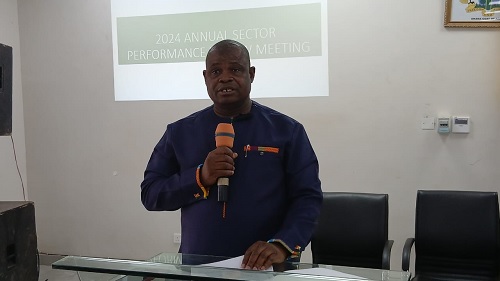Two health facilities in the North East Region have been shut down following chieftaincy disputes in the area for the past two months.
The facilities are Bimbagu and Ngaama Community-Based Health Planning and Services (CHPS) compounds all in the Bunkpurugu-Nakpanduri District.
However, the Wenchiki Health Centre and Gbegbani CHPS compound which were initially closed down for similar insecurity situations have since been reopened.
The North East Regional Director of Health Services, Dr Braimah Baba Abubakari, who disclosed this, said the facilities had been closed down to ensure the safety of health workers and patients.
He indicated that the situation had disrupted healthcare services in the affected communities, particularly emergency services.
Dr Abubakari was speaking at the 2024 Annual Health Sector performance review meeting in Nalerigu.
The event which was on the theme: "Rational management of health workforce towards achieving quality universal health coverage" aimed at evaluating achievements, challenges and measuring progress against set targets over the past year as well as proposing solutions to enhance healthcare delivery in 2025.
It brought together key stakeholders in the health sector, including traditional and religious leaders, government officials, and international partners such as the Korea International Cooperation Agency (KOICA), the United Nations Children's Fund (UNICEF), Catholic Relief Services (CRS), and Savanna Signatures.
Impact on health
For the past months, there have been communal clashes in Bimbagu and Ngaama communities which have resulted in the loss of many lives, including a teacher who was burnt into ashes.
![]()
Participants in the meeting
Following the tension in the communities, a number of residents, particularly women, children and workers have fled for safety.
Dr Abubakari expressed worry over the closure of the facilities, warning that prolonged insecurity could further weaken healthcare delivery in the affected communities.
He urged the Regional Security Council (REGSEC) and the traditional authorities to work towards a peaceful resolution to enable the resumption of healthcare services.
The Regional Director pointed out that the region continues to make strides in healthcare delivery, particularly through the implementation of the Health Sector Medium-Term
Development Plan, aimed at achieving Universal Health Coverage (UHC) by 2030.
However, he noted a 2.8 per cent decline in Out-Patient Department (OPD) attendance, with cases dropping from 498,448 in 2023 to 484,444 in 2024.
This, he said, led to a reduction in OPD per capita from 0.72 in 2023 to 0.65 in 2024.
On maternal and child health, he highlighted a modest increase in antenatal care registration during the first trimester, rising from 40.6% in 2023 to 42.3% in 2024, attributing the improvement to intensified health education on early pregnancy reporting.
Challenges
In spite of these gains, Dr Abubakari expressed concern over the rise in stillbirth rates from 8.6 per cent in 2023 to 9.1 per cent in 2024 and an increase in institutional neonatal mortality from 4 per 1,000 live births in 2023 to 6 per 1,000 live births in 2024, representing a 29.8 per cent rise.
He also highlighted inadequate health infrastructure as a major challenge hindering the smooth delivery of quality healthcare in the region.
Given the lack of medical store in the region, he said the directorate relied on the Northern Regional Medical Stores for the supply of essential drugs and medical consumables, which often causes delays in supply.
For his part, the North East Regional Minister, Ibrahim Tia, commended the health directorate for its efforts in ensuring quality healthcare delivery in the area.
He reaffirmed the government's commitment to strengthening the sector and supporting the region in achieving its health goals.
Strengthen healthcare
A representative of KOICA, Myeongseon Kim, reaffirmed the Korean government’s support for healthcare development in Ghana.
She highlighted KOICA’s ongoing initiatives, including the Increasing Health Security Capacities through the Global Security Agenda, the Improving Reproductive, Maternal, Newborn, Child, and Adolescent Health and Nutrition project, and the CHPS+ Phase Two Project in the North East and Upper East regions.
She stressed the importance of strengthening the healthcare workforce, improving healthcare infrastructure, and promoting community engagement to achieve better health outcomes.
Writer's email:mohammed.fugu
@graphic.com.gh

